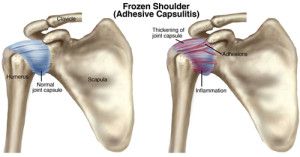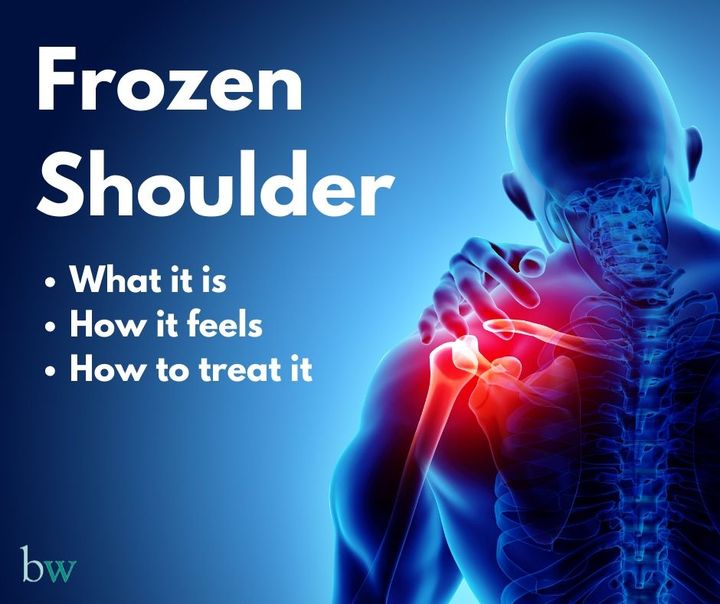Sadly this version has no princesses or catchy tunes! But with a bit of help you can “Let it go” (sorry I couldn’t help myself!).
Adhesive Capsulitis
 This is when the “capsule” that surrounds the shoulder joint becomes stiff and tense (adhesion). So the shoulder joint becomes “frozen” and painful to move.
This is when the “capsule” that surrounds the shoulder joint becomes stiff and tense (adhesion). So the shoulder joint becomes “frozen” and painful to move.
With 3 bones, over 10 muscles groups and numerous ligaments and tendons the shoulder is a hugely complicated joint.
Frozen Shoulder, like “Tennis Elbow” or “Golfers Elbow” is one of those non-medical terms that is used as a catch all term to describe a whole bunch of conditions.
And there are actually a number of injuries that can imitate the symptoms of “Frozen Shoulder”:
- Rotator cuff injury
- Impingement syndrome
- biceps tendonitis
- supraspinatus tendonitis
- bursitis
- instability issues (as in, the shoulder could just pop out!)
- osteoarthritis of the A/C (Acromioclavicular Joint) and/or the shoulder joint
- and the neck can also cause problems!
Previous injuries, falls and dislocations can also alter how you move the joint long term, causing issues on either the injured side or the shoulder that is compensating.
What to do?
I know I’m going to sound like a broken record here but, the first step is always a full, detailed, clinical assessment. There is so much going on at the shoulder that your therapist should always spend the time doing a proper investigation before starting work to make sure that you are treating the correct shoulder for the correct problem (and not the neck, upper back or opposite side!). Taking the time at the beginning will save you a LOT of time (and money!) later.
Treatment
Your treatment should include deep tissue work to help these big muscle groups. It will probably also include some electrotherapy, again to get deep into these big, strong muscles.
There should also be some homework, the shoulder joint needs to be stable, and that stability needs to be taught and practiced.
If you’re a sports person we should also assess how you move and swing in your sport, it might be that some minor corrections to your serve or golf swing get you moving a LOT quicker.
Here at the clinic I often include Magnetic Resonance Therapy to get the shoulder moving again and strengthen the joint. This is also really great for preventing future dislocations as it strengthens all those ligaments and tendons holding the shoulder in place.


